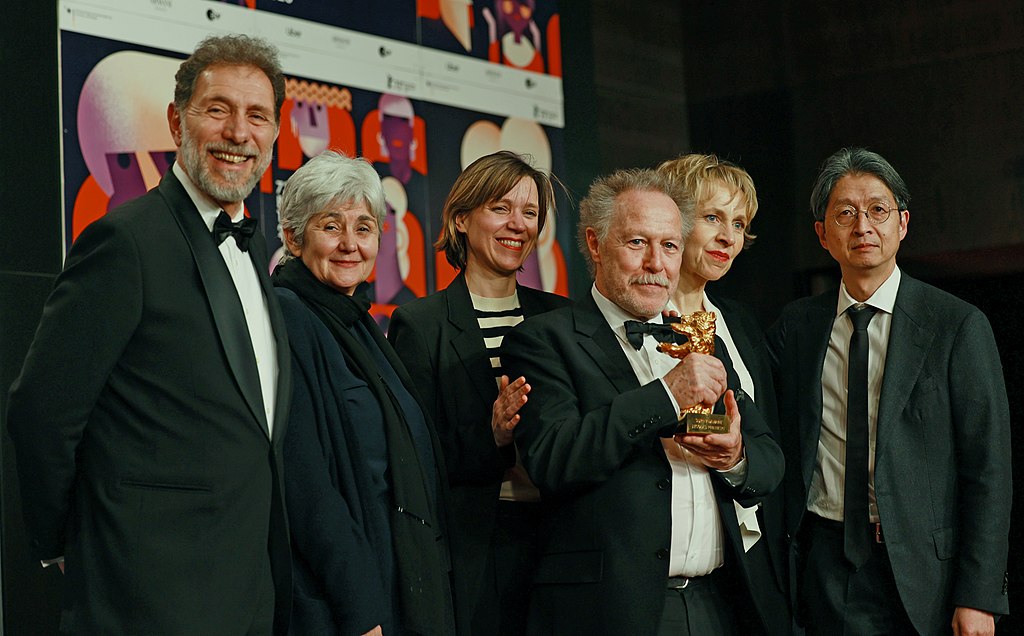Golden Bear Glory: Why Berlinale’s Top Award Holds Global Filmmaking Power

The Golden Bear, Berlinale's top prize since 1951, transforms directors' careers from obscurity to prominence. You'll find winners like Kurosawa, Bergman, and Miyazaki showcasing how this prestigious award elevates boundary-pushing cinema. It grants winners critical acclaim, commercial success, and protection against censorship. Films receiving this honor often set artistic benchmarks, challenge industry norms, and create cultural dialogues. The trophy's influence extends far beyond the festival's closing ceremony.
Key Takeaways
- The Golden Bear elevates directors from obscurity to international prominence while providing leverage against censorship for banned filmmakers.
- As one of the "Big Three" most prestigious film festivals globally, winning establishes artistic benchmarks for directors worldwide.
- The award celebrates boundary-pushing cinema selected by an international jury of film industry luminaries.
- Golden Bear winners often compete for Academy Awards and gain critical and commercial success.
- The award creates cultural dialogues around urgent issues and identifies techniques reshaping filmmaking language.
The Origin and Significance of the Golden Bear Award
When cinematic excellence meets international recognition, the Golden Bear stands as the ultimate symbol of achievement at the Berlin International Film Festival. Established in 1951, this prestigious award identifies the most outstanding film in the festival's competition, celebrating boundary-pushing cinema.
The award's reputation has been built through winners like Kurosawa, Bergman, and Miyazaki—directors whose work defined generations of filmmaking.
You'll find the Golden Bear's significance extends far beyond the Festival itself. When a film receives this golden statue, it gains immediate global attention, enhanced distribution opportunities, and often commercial success.
The International jury, comprised of film industry luminaries, evaluates entries on direction, screenplay, performances, and visual elements before bestowing this career-defining Bear on deserving creators.
As part of the Big Three film festivals globally, the Berlin International Film Festival provides winners with unparalleled prestige in the international filmmaking community.
A Legacy of Excellence: Notable Golden Bear Winners Through History
Throughout its distinguished history, the Golden Bear has adorned the shelves of cinema's most innovative storytellers. The Berlin Film Festival's best directors have consistently pushed boundaries, with Akira Kurosawa's "Rashomon" winning in 1951 and Ingmar Bergman's "Wild Strawberries" claiming victory in 1958.
The awards showcase remarkable diversity, from Ang Lee's literary adaptation "Sense and Sensibility" (1996) to Paul Thomas Anderson's ambitious "Magnolia" (2000). You'll find few filmmakers whose performance behind the camera rivals Hayao Miyazaki, whose "Spirited Away" won in 2002.
While the Silver Bear recognizes specific achievements in categories like acting and screenwriting, the Golden Bear celebrates complete cinematic vision. Unlike films depicting controversial figures like Pablo Escobar, these winning works represent artistic achievement at its highest level, transcending mere entertainment. Many Golden Bear winners demonstrate the same innovative spirit that transformed 1930s cinema with advancements like synchronized sound that revolutionized storytelling techniques and viewer experiences.
How the Golden Bear Transforms Directors' Careers
Three distinct career trajectories emerge when directors claim Berlin's prestigious Golden Bear. You'll notice how this Berlinale trophy consistently elevates filmmakers from relative obscurity to international prominence.
- Critical and commercial elevation - Directors like Kurosawa, Bergman, and Lee rode Golden Bear momentum to unprecedented acclaim and box office success
- Artistic vision amplification - Miyazaki's distinctive style reached global audiences after Berlinale recognition
- Innovation platform - Anderson and Panahi solidified reputations as innovative, socially conscious voices
- Political barrier dissolution - For filmmakers like Rasoulof, the Golden Bear provided leverage against censorship

This coveted award doesn't just validate artistic achievement—it grants tangible career benefits including creative freedom, funding opportunities, and worldwide distribution channels that transform directorial careers permanently.
Similar to how Kurosawa's innovative techniques in editing and storytelling set new standards for cinema worldwide after receiving international recognition.
The Selection Process: Inside the Berlinale Jury Deliberations
Behind every career-transforming Golden Bear lies a meticulous selection process shrouded in relative mystery. At the Berlin International Film Festival, the International Jury, led by a prestigious president, bears the weighty responsibility of selecting cinema's most deserving voices.
Their decisions reverberate far beyond the Berlin jury room, sparking industry-wide debates and cementing the festival's influence. This rigorous process guarantees that film festivals like Berlinale maintain their authority in recognizing groundbreaking cinema that resonates globally.
You'll find this Berlinale jury watching every competition film with critical eyes, considering artistic merit, originality, social impact, and cultural significance during intense deliberations. The panel, comprised of acclaimed filmmakers and critics, must reach consensus through in-depth discussions before the award ceremony. Since the 1930s, prestigious film festivals like Berlinale have championed auteur-driven projects over commercial ventures, preserving artistic integrity in global cinema.
Banned Filmmakers and Political Statements at the Berlinale
The Berlinale consistently finds itself at the intersection of artistic celebration and political controversy, particularly when honoring filmmakers who can't attend their own triumphs. The festival's Golden Bear has become a powerful political platform, especially for banned Iranian directors who've used their recognition to highlight oppression.
Consider these notable political dimensions of the Berlinale:
- Two banned Iranian filmmakers—Panahi and Rasoulof—have previously won the Golden Bear while prohibited from attending
- "My Favourite Cake" could mark the third Iranian Golden Bear winner in a decade from directors unable to attend
- Mati Diop's raised fist during her acceptance speech exemplifies how filmmakers leverage the platform for statements
- Festival leadership now struggles to balance artistic expression with diplomatic concerns, as the mayor's call for political restraint demonstrates
From Golden Bear to Global Distribution: The Award's Market Impact
Beyond artistic prestige, winning the Golden Bear catapults films into a lucrative commercial trajectory that transforms their market potential. You'll find that recipients experience a 30-40% boost in international box office performance compared to films that merely won the Silver Bear Jury prize.
At Berlin's Golden awards ceremony, the prize does more than honor artistic achievement—it signals quality to distributors worldwide. While the honorary Golden Bear celebrates career achievement, it's the competitive first place trophy that dramatically affects a film's commercial fate.
When your project has won the Silver Bear for outstanding achievement but missed the top honor, you'll still benefit—though not as dramatically as Golden Bear winners, who consistently secure wider distribution deals and attract higher-profile talent for future projects.
Gender-Neutral Pioneers: Berlin's Progressive Approach to Acting Awards
While many prestigious film festivals cling to traditional gender divisions, Berlin's bold decision to implement gender-neutral acting awards has positioned it as a progressive pioneer in the industry. You'll notice this commitment to inclusivity reflects Berlinale's broader mission of celebrating diverse voices in cinema.
The festival's approach offers:
- Recognition based on performance quality rather than gender identity
- Equal opportunity for actors like Lilith Grasmug and Josefa Heinsius in Langue Étrangère to compete for the same performance honor
- A complementary vision to other Berlinale prizes like Best First Feature and Lifetime Achievement awards
- A challenge to other major festivals to reconsider their traditional award structures
This gender-neutral stance reinforces Berlin's reputation as a global leader in promoting equality within the film industry, establishing standards other festivals may eventually follow.
Documentary Triumphs: When Non-Fiction Films Capture the Bear
Documentary filmmaking has carved out a prestigious place at the Berlinale, with non-fiction works increasingly taking home the festival's highest honor, the Golden Bear.
You'll find ample evidence of this trend in recent years. Nicolas Philibert's "On the Adamant" claimed the coveted award in 2023, continuing the festival's commitment to boundary-pushing documentaries.

In 2016, Gianfranco Rosi's "Fire at Sea" earned Golden Bear recognition by masterfully portraying Europe's migrant crisis through intimate storytelling.
Most recently, Mati Diop's "Dahomey" (2024) confronted the complex issue of repatriated African art, further cementing the Berlinale's dedication to socially crucial documentaries. This pattern isn't coincidental—documentaries have represented nearly half of all Golden Bear winners in the past decade, transforming what was once a fiction-dominated award into a fundamental platform for non-fiction excellence.
Beyond the Trophy: How Golden Bear Films Shape Cinema Culture
The Golden Bear award transcends mere trophy status, transforming winning films into cultural landmarks with lasting influence. You'll notice many winners later compete for Academy Award for Best Picture honors, as did "12 Years a Slave," following its Berlin premiere.
These prestigious films impact cinema in four distinctive ways:
- They establish artistic benchmarks that directors like Martin Scorsese reference in their own work
- They challenge industry norms, similar to how the festival's Silver Bear for best performance rejects gender divisions
- They spotlight emerging visionaries like Veronika Franz and Severin Fiala, who gain international recognition
- They create cultural dialogues around urgent issues, reminiscent of how "Black Panther" sparked conversations about representation
The Bear for outstanding artistic contribution often identifies techniques that reshape filmmaking language and influence generations of creators.
Martin Kraft, MKr354563 Mati Diop (Goldener Bär der Berlinale 2024), CC BY-SA 4.0
Ariela Ortiz-Barrantes, Mohammad Rasoulof at 2024 Cannes Film Festival (The Seed of the Sacred Fig director), CC BY-SA 4.0
Elena Ternovaja creator QS:P170,Q110906093, Film Crew of Sur l'Adamant, Berlinale 2023, CC BY-SA 3.0




